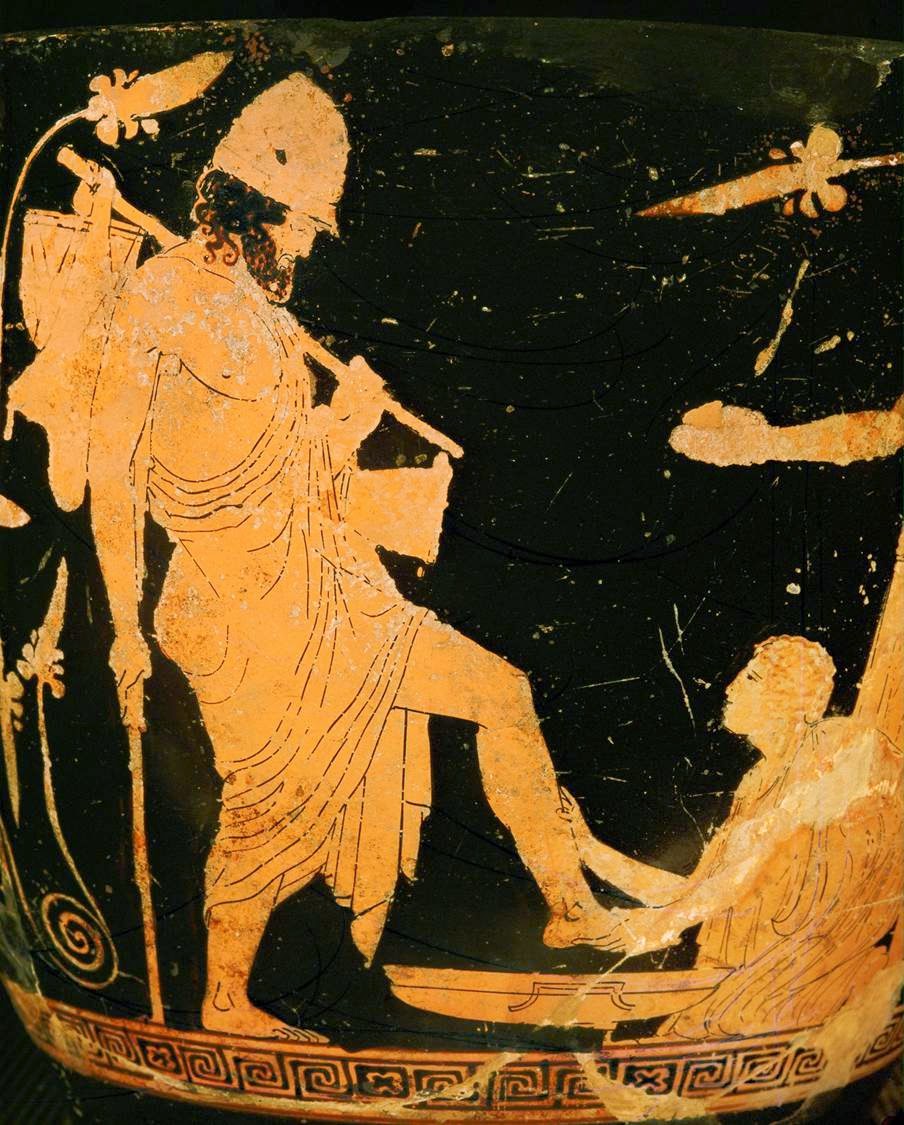The homecoming is often the hardest part of the hero's journey. Odysseus has survived sea monsters and sirens and the wrath of a sea god and is at last on his home island. But he has been away for ten years since the war he went to fight, and almost everyone believes he is dead. His palace is full of brutish and lustful men, suitors vying for the hand of his wife Penelope and with it, his kingdom. Their appetites are laying waste to his livestock, his wine cellar and his female servants.
At the prompting of his constant guide, who is no less than the goddess Athena, Odysseus has disguised himself in the rags of a beggar, with a funny traveler's hat. He is mocked and scorned by the suitors and even some of his own retainers. Nobody recognizes him. They will find it hard to recognize him even when he shows himself in a different form. His homeland seems stranger to him than the magic realms from which he has returned. He must be asking himself, Which is the dream? He may be wondering whether he is dead.
He spends a sleepless night, tossing and turning. This is wonderfully conveyed in the muscular modern verse of Robert Fagles, which will speak to anyone who has struggled through a night like this:
...But he himself kept tossing, turning,
intent as a cook before some white-hot blazing fire
who rolls his sizzling sausage back and forth,
packed with fat and blood - keen to broil it quickly,
tossing, turning it, this way, that way - so he cast about
- Odyssey Book 20, lines 27-30, Fagles translation
The "man of many ways" is seeking a way to expel the suitors who have taken over his home. But they are many and he is one, and even if he finds the way to kill them all, their kinsmen will come to take revenge. The goddess Athena now appears to him in mortal form, "swooping down from the sky in a woman's build and hovering at his head". She wants to know why he is still awake, fretting and exhausting himself. Why does he distrust her when she assures him that he will gain victory that day? Athena promises that "even if fifty bands of mortal fighters closed around us, hot to kill us off in battle" - because she is with him.
Athena "showered sleep across his eyes", but when Odysseus wakes, on the morning of Apollo's feast day, even the promise of a goddess is not enough. He wants further signs. He speaks to the All-Father, Zeus. "Show me a sign." In fact, Odysseus asks for two signs, "a good omen voiced by someone awake, indoors" and "another sign, outside, from Zeus himself."
He is answered at once by a great roll of thunder, out of a clear blue sky.
Then he hears a "lucky word" from a woman grinding grain inside the halls. Hearing thunder from a cloudless sky, the woman recognizes a sign from Zeus. She speaks aloud to the king of the gods:
Sure it's a sign you're showing someone now.
So, poor as I am, grant my prayer as well;
let this day be the last, the last these suitors
bolt their groaning feasts in King Odysseus' house!
- Odyssey Book 20, lines 128-131
The twin oracles - from the sky and from overheard speech - harden Odysseus' resolve, and the scene is set for the astonishing slaughter of the suitors under the rain of arrows from the bow that none but the hero (and his son) can bend. In the Fagles version, Book 20 of the Odyssey is given the title "Portents Gather", and it is a good one. Here we see oracles speak in ways the Greeks observed closely and valued highly: through brontomancy, divination by thunder, and cledonomancy, divination by overheard speech or sound.
In the Odyssey, as in ancient Greek society, dreams and visions are the most important mode of divination. Yet our understanding of dreams may be deceptive, as Penelope explains in Book 19, when she speaks of the since-famous gates of ivory and horn. So even when blessed by a direct encounter with a goddess, the hero turns to the world around him for confirmation.
Quotations are from Robert Fagles (trans) The Odyssey published by Penguin Books.
Graphic: Odysseus in beggar's disguise, about to be identified by his childhood nurse Eurykleia, when she sees the scar on his thigh from "the wound I took from the boar's white tusk on Mount Parnassus."
Tuesday, December 19, 2023
Homer's Book of Portents
Subscribe to:
Post Comments (Atom)


No comments:
Post a Comment